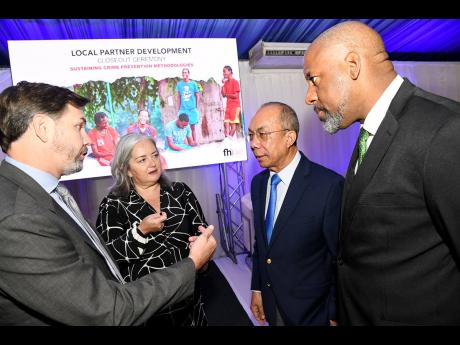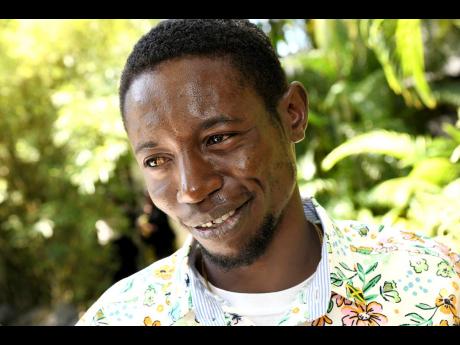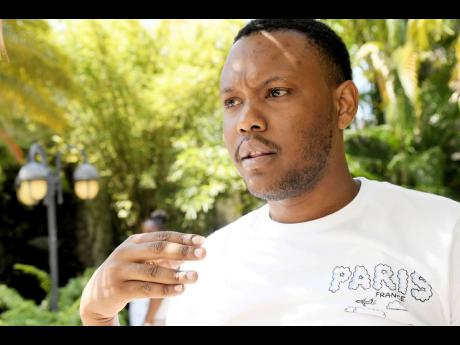‘I am coming from a dark background’
-Inner-city entrepreneur celebrates his lifestyle turnaround through social transformation programme
Thirty-year-old Emerson Benjamin says he has turned a new leaf, having shunned his former lifestyle of being engaged in criminal activities, and is now more focused and driven to be an agent of positive change in his community of Majesty Gardens in Kingston 11.
Benjamin is one of several youths who in 2020 benefitted from a social intervention programme which targetted inner-city youths to effect change in their behaviours and circumstances.
“I am coming from a dark background, but the programme helped to build my mindset,” he said. Benjamin who has seven children, the eldest being 15 years old and his youngest, 8 months old, said that he is now gainfully employed as an in-house technician at a corporate (area) company.
In his free time, he offers voluntary services through his foundation, The Positive Impact, and through his computer company called the LIF Solution, which he manages with a business partner. He is now aiming to develop a chicken-rearing project to provide other youth a means of earning a living.
“My area is difficult because it’s plagued with violence [but] for me to achieve what I have achieved, I wouldn’t really say that the community has determined who I am,” he added.
According to the programme’s research statistics, 57 per cent of at-risk youths from inner-city communities in Jamaica who participated in the United States Agency for International Development (USAID) and FHI 360’s Local Partner Development (LPD) activity programme are now more likely to become constructive and contributing members of society.
The LPD is a six-year programme which was funded by the USAID and implemented by FHI 360, a non-profit human development organisation.
Over 650 youths in over 30 volatile communities across the parishes of Kingston and St Andrew, St Catherine, Clarendon, St James, and Westmoreland were mentored and trained in life skills.
Three hundred and forty-six youths received psychological therapy, 289 were trained in a vocational skill, 140 received business development training and grants, and 109 were placed into jobs.
At the end of these interventions, participants demonstrated less antisocial tendencies, stronger anger and impulsivity control and improved livelihood prospects.
Twenty-five-year old Sammaire Petgrave from Glendevon, St James has praised the intervention.
Speaking with The Gleaner at the LPD close-out ceremony which was held at Terra Nova All Suite Hotel in St Andrew on Wednesday, he detailed that he first learned about the programme through Dr. Horace Chang, member of Parliament (MP) for St James North Western who visited his community, which had been rocked by gang violence.
Petgrove said that Chang, who is also the minister of national security, reached out to some of the young men who were on the street corner and discussed with them better options for them to pursue in life rather than engaging in criminality.
“We talked a lot that day for about an hour or two about how we can help develop the community,” he said.
“There are things that affect us that allows us to do the things we do which is not right, but having a listening ear from professional persons outside [of the community] really helps us to come out of our comfort zone and talk about things that we don’t talk about to other persons,” he added.
Petgrove started the programme in 2022 which lasted for one year. He has since gone on to gain employment at Hyatt Zilara and Hyatt Ziva all-inclusive resorts. He told The Gleaner that he has been psychologically transformed through his involvement in the programme.
“The foundation of all this chaos, in my view, is the lack of education,” Petgrove said of the widespread involvement of youth in criminal activity. He said that in his community, “less than one handful of persons graduate from high school (who) are involved in street activities”.
It was reported that more than half of the participants showed reduced risk levels, including less antisocial tendencies, stronger anger and impulsivity control and improved livelihood prospects.
Throughout its six years of implementation, the LPD has supported the Caribbean Basin Security Initiative framework by collaborating with close to 40 local organisations from government, civil society, and private sector to advance youth crime and violence prevention through secondary and tertiary prevention initiatives.
Among the approaches that were developed and mainstreamed in collaboration with partners were the case management methodology which was implemented in collaboration with the Ministry of National Security and involves a comprehensive and collaborative process of assessment, planning and coordination of services Aprovided to meet the unique needs of at-risk youths and the introduction of the Transforming Our Perspective Cognitive Behavioural Therapy (TOP-CBT) Model, Jamaica’s first group CBT approach for youth crime and violence prevention. The model serves to reduce self-destructive behaviours by teaching individuals to evaluate and modify the way they think and make decisions
Fayval Williams, Minister of Education and Youth, during her remarks, bemoaned the high number of Jamaican youths who are caught up in crime and violence which have long-lasting, negative effects on their lives.
She said that as young people are the future of our communities, it was imperative that we made it our responsibility to ensure that they are provided with the necessary tools and resources to lead fulfilling lives and become productive members of society.
“Yesterday, we were at the Jose Marti Technical High School in St. Catherine with the minister of justice [where] we’re going around the island introducing [and] increasing awareness of restorative justice. One of his team members in presenting asked the question, “How many of you know of or have seen someone get arrested?’ and maybe 90 per cent of students raised their hands. That is what we are dealing with here in Jamaica,” she said.
Alex Gainer, acting USAID country representative to Jamaica, in his remarks stated that the US$16 million programme is a part of the broader relationship that the United States has with Jamaica in assisting to achieve Vision 2030 and to foster a more secure society.
“We all know that young people deserve a chance to fulfil their potential and that community organisations play an essential role in helping .. .to avoid crime and violence,” he said.
He congratulated the participants for completing the activities and commended the partners for their commitment. He noted that as the programme has come to an end, it was now up to the government and private sector organisations to advance and sustain the gains achieved, and put the tools in place to assist in stemming youth involvement in crime and violence.
“I want to stress that the United States government is still dedicated to youth crime and violence prevention in Jamaica,” he said.
He added that more than US$10 million is provided to Jamaica by the US on an annual basis in this effort.



